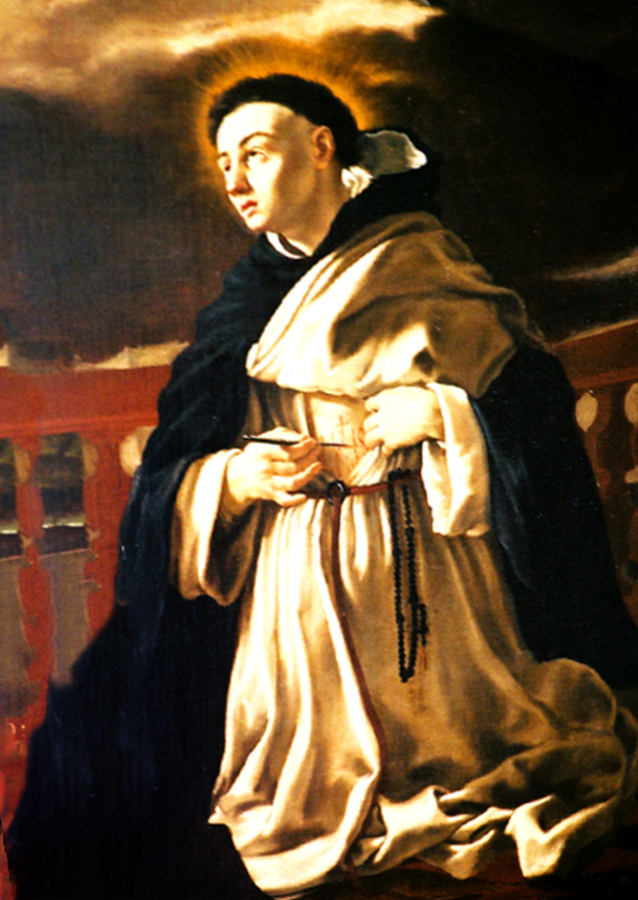
Blessed Henry Suzo was born in 1300 at Constance in Germany. There he entered the Dominican convent at the age of thirteen, and made his preparatory studies in the sacred disciplines. In 1327 he became a teacher of theology, and in 1334 began preaching. In 1343 he was elected prior of a convent at Diessenhofen. Blessed Henry is known especially as a mystic who regarded himself as the servant of Eternal Wisdom become Man. He practiced severe austerities and experienced, along with his visions and ecstasies, bitter persecutions and grievous calumnies.
He assisted in the restoration of strict religious observance in the cloisters, especially in the Dominican convents for women at Katherinentahl and T?ss. One of the Superiors in these convents preserved most of his letters and obtained the history of his life, which he himself later edited and published. As a preacher he was highly esteemed in many Swiss and Dutch cities. It is said that for 150 years there was no book of meditation more widely read in the German language than his Little Book of Eternal Wisdom. Blessed Henry translated this work into Latin as well, and added at that time to its contents.
He died in 1366; 250 years later, in 1613, workers in the old convent at Ulm found his body perfectly conserved and emitting a pleasant fragrance. Unfortunately the non-Catholic authorities of the city had the tomb closed; and the Bollandists, famous hagiographists of 19th century France, wrote in 1882 that no trace was any longer known of it. He was declared Blessed in 1831 by Pope Gregory XVI.
The Catholic Encyclopedia, edited by C. G. Herbermann with numerous collaborators (Appleton Company: New York, 1908); Les Petits Bollandistes: Vies des Saints, by Msgr. Paul Guérin (Bloud et Barral: Paris, 1882), Vol. 3.
Scripture (Rom 12:1-3)
I urge you, brothers and sisters, in view of God’s mercy, to offer your bodies as a living sacrifice, holy and pleasing to God—this is your true and proper worship. Do not conform to the pattern of this world, but be transformed by the renewing of your mind. Then you will be able to test and approve what God’s will is—his good, pleasing and perfect will. For by the grace given me I say to every one of you: Do not think of yourself more highly than you ought, but rather think of yourself with sober judgment, in accordance with the faith God has distributed to each of you.
Writings
(Year B). May the name of God be hallowed in you that you may joyfully drink from the wounds of Christ! May divine love, true peace, deep humility flowing from the faithful heart of Jesus, and joyful forgetfulness of self in the company of the most dear Son of God and of the Virgin Mary be yours. This is my "Lord's Prayer" for bidding you farewell in Christ Jesus.
My little ones, may you experience such a spirit in your good works and be such a work before God. Although your works may be many, may you be one in heart. Grace is given now and glory in eternity in greater abundance for the soul which is entrusted to the hands of God than for the soul which is outwardly perfect, however great and holy it may appear.
Cultivate all the virtues you can, yet do not place your confidence in them, but in Christ alone.
Turn your hearts to Christ in your heavenly homeland and, through burning desire rather than through your senses, consider this earth as a kind of sweet exile where you await the will of God with eagerness for God's honor. Receive everything from the hands of God -- joy, labor, hardships, prosperity, honor, happiness, disgrace, and calumny. Above all, lie prostrate before his feet, casting yourselves so completely and perfectly to the ground that no one can bring you lower. Rejoice in honoring our Lord, sigh for him, love him, seeking no delight for yourselves. Trust in him and never cease proclaiming your love for him.
My dearest ones, receive this message from God for your good through me, a poor sinner, who is in every way your friend. What? Don't you want to confess your sins? "Yes, gladly, dear brother." Do not confess the sins of others. Do not judge one whom you do not wish to imitate. Rather, through understanding of your own lowliness discover judgment for others.
Do you not wish to experience God's presence? Then learn to know yourself. Do you not wish to receive a new illumination and grace from God? Then learn to recognize God's gifts and give thanks for every grace you receive from God.
Do you not wish to live in God and to have God live in you both now and in eternity? Then learn to die to self for the lofty life of the soul is hidden in the dying and death of natural desires. In both joy and sorrow this death, which we have chosen in every instance in which we can seize either joy or sorrow, makes it possible for us to follow the naked and despoiled Christ, being naked and despoiled ourselves.
This will serve as a short guide. Diligently set yourself apart from everything which lasts but a short time. Wisely purify yourself of everything which has the guise of creatures. Confidently be lifted heavenward with Christ. Firmly rule your natural self with prudence. Humbly show yourself to be agreeable and you will be able to know the truth. That is all for now. Farewell! (Letters)
Musical Selection (John Michael Talbot)